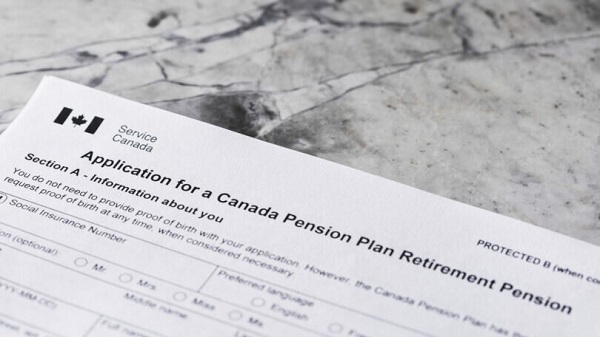Banks
Canada Pension Plan becomes latest institution to drop carbon ‘net zero’ target

From LifeSiteNews
Changes to the law require companies to more rigorously prove their environmental claims.
The investment group in charge of Canada’s governmental pension plan has ditched its “net zero” mandate, joining a growing list of major institutions doing the same.
According to the Canada Pension Plan (CPP) Investments’ latest annual report, the entity is no longer committed to carbon “net-zero” by 2050. The CPP’s ditching of the target comes after a number of major institutions, including the Royal Bank of Canada (RBC), Toronto-Dominion Bank (TD), Bank of Montreal (BMO), National Bank of Canada, and the Canadian Imperial Bank of Commerce (CIBC), all made similar moves in recent months.
While ditching the net-zero effort, chief executive of CPP Investments John Graham maintained that it is still “really important to incorporate climate and incorporate sustainability” in its long-term investment portfolio.
The dropping of the “climate” target comes as recent changes to Canada’s Competition Act now mandate that companies prove any environmental claims they make, with Graham insinuating these changes were a factor in the decision.
“Recent legal developments in Canada have introduced, kind of, new considerations around how net-zero commitments are interpreted, so that’s caused us to change a little bit how we talk about it, but nothing’s changed on what we’re actually doing.”
Over the past decade, left-wing activists have used “net zero” and “environmental, social & governance” (ESG) standards to encourage major Canadian and U.S. corporations to take particular stands on political and cultural issues, notably in promotion of homosexuality, transgenderism, race relations, the environment, and abortion.
Outside of Canada, many major corporations have announced they are walking back DEI and other related policies. Some of the most notable include Lowe’s, Jack Daniel’s, and Harley Davidson. Other companies such as Disney, Target, and Bud Light have faced negative sales due to consumers fighting back and refusing to patronize the businesses.
Since taking power in 2015, the Liberal government, first under Justin Trudeau and now under Mark Carney, has continued to push a radical environmental agenda in line with those promoted by the World Economic Forum’s “Great Reset” and the United Nations’ “Sustainable Development Goals.” Part of this push includes the promotion of so called net-zero energy by as early as 2035.
Banks
Legal group releases report warning Canadians about central bank digital currencies

From LifeSiteNews
By
“central bank digital currency could hand incredible power to the Government and Bank of Canada to monitor financial transactions, punish whatever behaviours the government deems undesirable, and penalize those on the wrong side of government ambitions”
The Justice Centre for Constitutional Freedoms released a new report examining how the adoption of a central bank digital currency in Canada could undermine the rights and freedoms of Canadians, including their privacy, autonomy, security, equality, and access to economic participation.
Financial transactions are increasingly conducted digitally. In 2023, a mere 11 percent of transactions were conducted with cash, according to Payments Canada.
This trend is not limited to individual consumers. Government entities, including government departments, agencies, and Crown Corporations, have rapidly digitized access to, and delivery of, their goods and services over the past decade.
READ: Mark Carney has history of supporting CBDCs, endorsed Freedom Convoy crackdown
Against this backdrop, in 2017, the Bank of Canada (a Crown Corporation) began exploring the possibility of implementing its own government-issued and government-controlled cashless currency – a central bank digital currency (CBDC).
In a 2023 Bank of Canada survey on CBDCs, however, 82 percent of 89,423 respondents strongly disagreed that the Bank of Canada should be researching or building the capability to issue a CBDC. Despite these results, the Bank of Canada continues to research a CBDC for Canada.
The Justice Centre’s report critically evaluates the impact a CBDC could have on Canadians’ fundamental rights and freedoms. Absent robust legislative protections and oversight, a CBDC could allow the Government and Bank of Canada to monitor Canadians’ purchases, donations, investments and other financial transactions.
A CBDC has the potential to empower government to reward and punish the behaviours and lifestyle choices of individual Canadians, as Communist China does with its “social credit” system. Allowing the government to peer into and influence Canadians’ purchasing behaviours could have a profoundly damaging impact on their privacy and autonomy, cautions the report.
READ: Financial expert warns all-digital monetary system would enable ‘complete control’ of citizens
Canada is not the first jurisdiction to explore a CBDC. This report evaluates the Bank of Canada’s exploration within a global context, applying lessons learned from jurisdictions like Nigeria, the Caribbean, and others.
After analyzing negative outcomes of “going cashless” in jurisdictions such as Australia, Sweden, Finland, and Norway, this report advocates for the value of cash and the need for robust institutional and legislative protections for the use of cash.
Ben Klassen, Education Programs Coordinator at the Justice Centre and lead author of the report, stated, “Many Canadian politicians and policy designers would have us participate in a frantic (and global) race to digitize goods and services, including our dollar. The finish line, we are told, promises heightened profitability, convenience, and security. While the pursuit of innovation and efficiency can deliver worthwhile rewards, we must always remember the values of privacy, autonomy, security, equality, and access to economic participation. Adopting a central bank digital currency risks excluding the homeless, the elderly, the ‘internetless,’ the technologically illiterate, and the conscientious objector.”
“Most seriously, a central bank digital currency could hand incredible power to the Government and Bank of Canada to monitor financial transactions, punish whatever behaviours the government deems undesirable, and penalize those on the wrong side of government ambitions,” continued Mr. Klassen. “This issue should be framed as a contrast between a ‘digital dollar’ and a ‘human dollar’ – our currency cannot be designed without regard for the humans and human values that will be profoundly impacted by its design.”
READ: RFK Jr. warns Americans ‘will be slaves’ if central bank digital currency is established
This report was produced in collaboration with Sharon Polsky – President of AMINAcorp.ca, President of the Privacy & Access Council of Canada, and a Privacy by Design Ambassador with more than 30 years’ experience in advising governments and policy designers on privacy and access matters.
Reprinted with permission from the Justice Centre for Constitutional Freedoms.
Alberta
SERIOUS AND RECKLESS IMPLICATIONS: An Obscure Bill Could Present Material Challenge for Canada’s Oil and Gas Sector

From Energy Now
By Tammy Nemeth and Ron Wallace
Bill S-243 seeks to “reshape the logic of capital markets” by mandating that all federally regulated financial institutions, banks, pension funds, insurance companies and federal financial Crown Corporations align their investment portfolios with Canada’s climate commitments
Senator Rosa Galvez’s recent op-ed in the National Observer champions the reintroduction of her Climate-Aligned Finance Act (Bill S-243) as a cornerstone for an “orderly transition” to achieving a low-carbon Canadian economy. With Prime Minister Mark Carney—a global figure in sustainable finance—at the helm, Senator Galvez believes Canada has a “golden opportunity” to lead on climate-aligned finance. However, a closer examination of Bill S-243 reveals a troubling agenda that potentially risks not only crippling Canada’s oil and gas sector and undermining economic stability, but one that could impose unhelpful, discriminatory measures. As Carney pledges to transform Canada’s economy, this legislation would also erode the principles of fairness in our economic and financial system.
Introduced in 2022, Bill S-243 seeks to “reshape the logic of capital markets” by mandating that all federally regulated financial institutions, banks, pension funds, insurance companies and federal financial Crown Corporations align their investment portfolios with Canada’s climate commitments, particularly with the Paris Agreement’s goal of limiting global warming to 1.5°C. The Bill’s provisions are sweeping and punitive, targeting emissions-intensive sectors like oil and gas with what could only be described as an unprecedented regulatory overreach. It requires institutions to avoid financing “new fossil fuel supply infrastructure” and to plan for a “fossil-free future,” effectively discouraging investment in Canada’s energy sector. To that end, it imposes capital-risk weights of 1,250% on debt for new fossil fuel projects and 150% or more for existing ones, making such financing prohibitively expensive. These measures, as confirmed by the Canadian Bankers’ Association and the Office of the Superintendent of Financial Institutions in 2023 Senate testimony, would have the effect of forcing Canadian financial institutions to exit oil and gas financing altogether. It also enshrines into law that entities put climate commitments ahead of fiduciary duty:
“The persons for whom a duty is established under subsection (1) [alignment with climate commitments] must give precedence to that duty over all other duties and obligations of office, and, for that purpose, ensuring the entity is in alignment with climate commitments is deemed to be a superseding matter of public interest.”
While the applicability of the term used in the legislation that defines a “reporting entity” may be a subject of some debate, the legislation would nonetheless direct financial institutions to put “climate over people”.

There are significant implications here for the Canadian oil and gas sector. This backbone of the economy employs thousands and generates billions in revenue. Yet, under Bill S-243, financial institutions would effectively be directed to divest from those companies if not the entire sector. How can Canada become an “energy superpower” if its financial system is directed to effectively abandon the conventional energy sector?
Delivered to You: It’s Free! Sign Up for the EnergyNow Canadian Energy Focused Newsletter Here
Delivered to You: It’s Free! Sign Up for the EnergyNow US Energy Focused Newsletter Here
Beyond economics, Bill S-243 raises profound ethical concerns, particularly with its boardroom provisions. At least one board member of every federally regulated financial institution must have “climate expertise”; excluded from serving as a director would be anyone who has worked for, lobbied or held shares in a fossil fuel company unless their position in the fossil fuel company was to help it align with climate commitments defined in part as “planning for a fossil fuel–free future.” How is “climate expertise” defined? The proposed legislation says it “means a person with demonstrable experience in proposing or implementing climate actions” or, among other characteristics, any person “who has acute lived experience related to the physical or economic damages of climate change.” Bill S-243’s ideological exclusion of oil and gas-affiliated individuals from the boards of financial institutions would set a dangerous precedent that risks normalizing discrimination under the guise of environmental progress to diminish executive expertise, individual rights and the interests of shareholders.
Mark Carney’s leadership adds complexity to this debate. As the founder of the Glasgow Financial Alliance for Net Zero, Carney has long advocated for climate risk integration in finance, despite growing corporate withdrawal from the initiative. Indeed, when called to testify on Bill S-243 in May 2024, Carney praised Senator Galvez’s initiative and generally supported the bill stating: “Certain aspects of the proposed law are definitely achievable and actually essential.” If Carney’s Liberal government embraces Bill S-243, or something similar, it would send a major negative signal to the Canadian energy sector, especially at a time of strained Federal-Provincial relations and as the Trump Administration pivots away from climate-related regulation.
Canada’s economy and energy future faces a pivotal moment. Bill S-243 is punitive, discriminatory and economically reckless while threatening the economic resilience that the Prime Minister claims to champion. A more balanced strategy, one that supports innovation without effectively dismantling the financial underpinnings of a vital industry, is essential. What remains to be seen is will this federal government prioritize economic stability and regulatory fairness over ideological climate zeal?
Tammy Nemeth is a U.K.-based energy analyst. Ron Wallace is a Calgary-based energy analyst and former Permanent Member of the National Energy Board.
-

 Fraser Institute1 day ago
Fraser Institute1 day agoFederal government’s ‘affordable housing’ strategy doomed without strong income growth
-

 Alberta2 days ago
Alberta2 days agoJann Arden’s Rant Will Only Fuel Alberta’s Separation Fire
-

 Health1 day ago
Health1 day ago21 Canadian doctors demand review of transgender drugs, surgeries for children
-

 Bruce Dowbiggin2 days ago
Bruce Dowbiggin2 days agoCaitlin Clark Has Been The Real Deal. So Her WNBA Rivals Hate Her
-

 armed forces2 days ago
armed forces2 days agoNew Trump-Pentagon ad resets mission: end wokeness, win wars
-

 Carbon Tax1 day ago
Carbon Tax1 day agoCarney picks up Trudeau’s net-zero wrecking ball
-

 Daily Caller2 days ago
Daily Caller2 days agoThere’s A Catch To California’s Rosy Population Stats
-

 conflict2 days ago
conflict2 days agoRussia Launches Largest Drone Attack Of War As Trump Loses Patience With Putin




